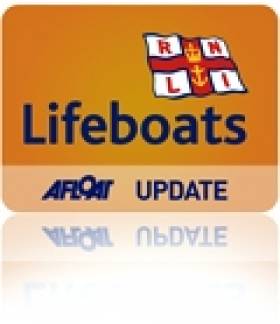Displaying items by tag: Lifeboat
Ballycotton Lifeboat Launched for Red Flares
Castletownbere RNLI Gets Go-Ahead for New Station
The announcement was made during a visit of architect Gordon J. Philip and RNLI Divisional Inspector Martyn Smith to the proposed site of the new lifeboat station in Castletownbere, County Cork. The station is being built on reclaimed land, which was given to the charity by the Irish Government. The cost of building the station will be in the region of €600,000 and will include crew changing facilities, meeting and training rooms and a workshop. There will also be a lifeboat shop where members of the public can purchase lifeboat souvenirs.
All materials to be used in the building are being sourced from Irish suppliers and the station has been designed to the highest standards. Work is scheduled to begin in September 2010 and due to be completed in thirty weeks.
The station has been operating out of temporary facilities on Dinish Island and it has meant that the lifeboat crew, who are largely based in the town, have had to travel to there and then reach the lifeboat by boarding boat. The new arrangement will see them assemble at the station on the quayside and board the lifeboat directly from a pontoon, which will cut launch times by up to five minutes.
Commenting on plans for the new lifeboat station Brian O’Driscoll, Coxswain with Castletownbere RNLI said, “This lifeboat station will make a huge difference to the crew. We expect to be able to cut around five minutes off our lifeboat launching time, which will mean a faster response time to emergencies. Paul Stevens, Deputy Second Coxswain added that “with the lifeboat being directly accessible from the pier we will be able to land casualties ashore, allowing us to handle serious situations with sensitivity and privacy.”
Scottish architect Gordon J. Philip has already designed seven RNLI lifeboat stations but Castletownbere will be his first in Ireland. Gordon who is from a fishing family is a former RNLI volunteer with Macduff RNLI, having spent four decades involved as lifeboat crew and station management. He is very aware of the need for the lifeboat crew to have proper facilities and for the station to be an important and aesthetically pleasing part of the community it is housed in. Gordon said, “I want this lifeboat station to be a landmark in the town for all the right reasons. We will be building on land that didn’t even exist last year and giving the lifeboat crew of the Annette Hutton a sheltered and secure home at the front of this beautiful town.”
At the formal opening of the RNLI lifeboat college in Poole in 2004 Queen Elizabeth and The Duke of Edinburgh met the Castletownbere crew members and departed the College on Castletownbere’s lifeboat Annette Hutton.






























































